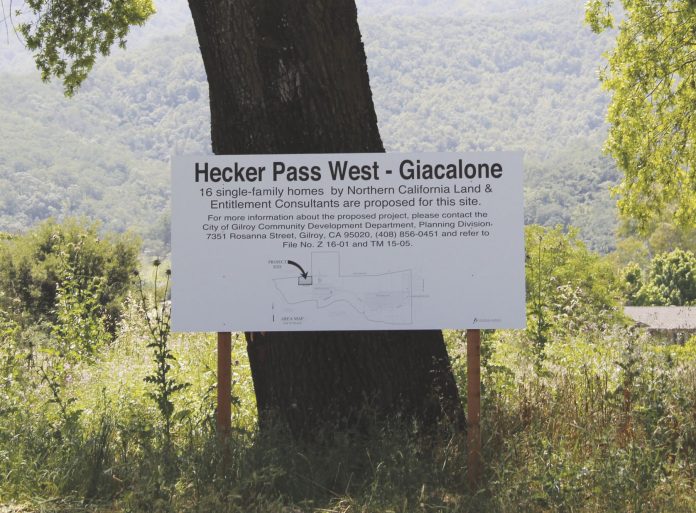
Greeted by nearly two dozen people who came to express concern Monday over a proposed zoning change, the City Council unanimously denied an application that would have cleared the way for construction of 16 two-story “duet-style” single-family homes along Hecker Pass Road.
Skip Spiering, who also serves as lead developer on the contentious Rancho Los Olivos housing project proposed for north Gilroy, was seeking to change the zoning of 2.1 acres of a 6.28-acre parcel currently zoned ag-tourism-commercial to residential cluster.
The application to amend the 12-year-old Hecker Pass Specific Plan and approve the subdivision of the 6.28-acre parcel known as Giacalone was also denied by the planning commission at its April 7 meeting.
The applicant, Northern California Land & Entitlement Consultants, Inc., which owns the parcel, appealed the planning commission’s decision at Monday’s council session.
In a letter to the council, Spiering stated: “There has been a huge change in development since the Great Recession . . . Consumers and business owners have different expectations and needs. The proposed project addresses the new reality by offering an attached residential transition to a boutique retail more in line with the wine and other tourism growing along Hecker Pass and in the region.”
At the meeting, city staff told the council the applicant needed the sale of the 16 homes to help fund the development of the approximately four acres remaining of the original parcel.
The public wasn’t buying it, however. Longtime Gilroy resident Robert Garcia pointedly asked the council, “who is it going to benefit?”
At the public hearing, the council heard numerous comments in support of preserving the “jewel of the city,” the stretch of Highway 152 lined with giant cedar trees planted in 1931-1932 and listed on the National Register of Historic Places in 2007.
No cedar trees would be removed as part of the plan, Spiering told the council.
Members of the public were nonetheless concerned about the construction of 16 single-family homes in the area.
Reading from a letter previously submitted to the council, Bette Thomas, who lives directly behind the 2.1-acre parcel in question, said, “If allowed, [this project] would set a precedent” and leave the remainder of Hecker Pass Highway subject to further zoning changes. “This is a rural area and should remain that way with more open space.”
During council discussions, Councilmember Dion Bracco voiced frustration over the requested zoning change.
“These developers worked with consultants in the city to come up with the [Hecker Pass] Specific Plan. It’s not even half-way built out and now they want to change it . . . I saw the plan with the restaurants and it’s beautiful, but they want to build the houses, and leave the rest to later. We all know that over and over again, we get promised one thing and what gets delivered is something else.”
According to the staff report, the Hecker Pass Specific Plan has been amended three times, twice to accommodate more housing, since its adoption in 2004.
Bracco concluded by saying that he did not believe the proposal was in keeping with the original intent of the Hecker Pass Specific Plan. So he would not be supporting it.
The council voted unanimously to deny the appeal of the planning commission’s decision, and reject the applicant’s request for an amendment to the Hecker Pass Specific Plan.
The council’s action on Monday leaves Syngenta Flowers without permission to install “open style security fencing” on three recently acquired parcels.
In a letter to the council, the company stated the specific plan amendments relating to fencing were “tagged on” to the application for the new 16-lot residential subdivision. “We want to ensure that regardless of whether the council approves or disapproves of the Meritage project, the fencing-related text amendments are duly considered and approved.”
In 2011, the council approved a variance that allowed the security fencing on two parcels the company owned at that time.













